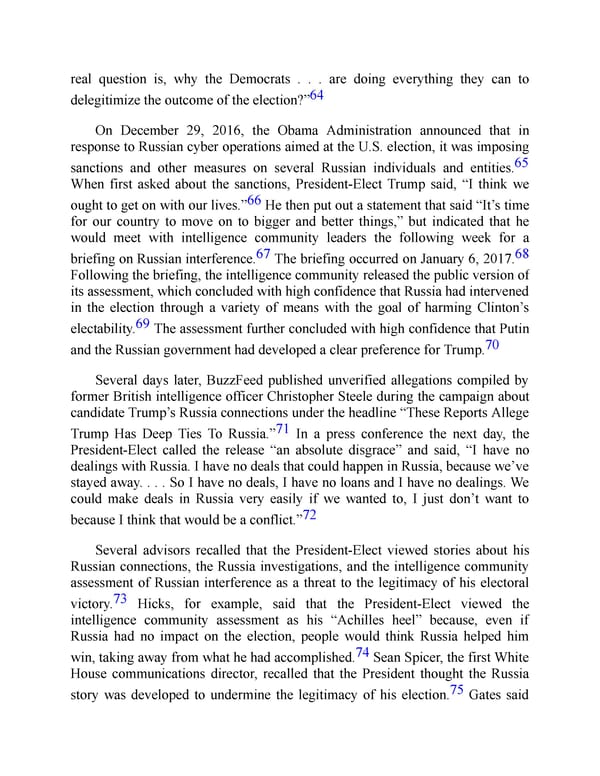real question is, why the Democrats . . . are doing everything they can to 64 delegitimize the outcome of the election?” On December 29, 2016, the Obama Administration announced that in response to Russian cyber operations aimed at the U.S. election, it was imposing 65 sanctions and other measures on several Russian individuals and entities. When first asked about the sanctions, President-Elect Trump said, “I think we 66 ought to get on with our lives.” He then put out a statement that said “It’s time for our country to move on to bigger and better things,” but indicated that he would meet with intelligence community leaders the following week for a 67 68 briefing on Russian interference. The briefing occurred on January 6, 2017. Following the briefing, the intelligence community released the public version of its assessment, which concluded with high confidence that Russia had intervened in the election through a variety of means with the goal of harming Clinton’s 69 electability. The assessment further concluded with high confidence that Putin 70 and the Russian government had developed a clear preference for Trump. Several days later, BuzzFeed published unverified allegations compiled by former British intelligence officer Christopher Steele during the campaign about candidate Trump’s Russia connections under the headline “These Reports Allege 71 Trump Has Deep Ties To Russia.” In a press conference the next day, the President-Elect called the release “an absolute disgrace” and said, “I have no dealings with Russia. I have no deals that could happen in Russia, because we’ve stayed away. . . . So I have no deals, I have no loans and I have no dealings. We could make deals in Russia very easily if we wanted to, I just don’t want to 72 because I think that would be a conflict.” Several advisors recalled that the President-Elect viewed stories about his Russian connections, the Russia investigations, and the intelligence community assessment of Russian interference as a threat to the legitimacy of his electoral 73 victory. Hicks, for example, said that the President-Elect viewed the intelligence community assessment as his “Achilles heel” because, even if Russia had no impact on the election, people would think Russia helped him 74 win, taking away from what he had accomplished. Sean Spicer, the first White House communications director, recalled that the President thought the Russia 75 story was developed to undermine the legitimacy of his election. Gates said
 Mueller Report PDF Page 298 Page 300
Mueller Report PDF Page 298 Page 300